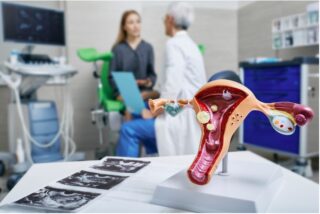Q Exchange
Better waiting for gynaecology services: primary and secondary care interactions
- Idea
- 2024

Meet the team
Also:
- Geeta Kumar - Consultant Obstetrician and Gynaecologist, Betsi Cadwaladr University Health Board, Wales
What is the challenge your project is going to address and how does it connect to the theme of 'How can we improve across system boundaries?
Waiting lists for elective gynaecology services have more than doubled since the start of the COVID-19 pandemic, with nearly 600,000 women currently on the waiting list in England, including over 33,000 waiting over a year from referral to treatment. The RCOG’s Left for too Long report highlighted the impact on women of waiting longer than ever for care, and called for action to improve experiences whilst waiting for care.
As waiting lists are long, the time between primary care referral and secondary care appointments has grown and women with debilitating symptoms often feel unsupported and ‘stuck’ with no support between their GP and a specialist.
This project aims to improve the experiences of those waiting for care by exploring self-management and active waiting. It will look to harness best practice around active waiting across primary, secondary and community sexual and reproductive health services to enhance outcomes as well as experiences of care.
What does your project aim to achieve?
The aim of this project is to coproduce evidence-based, active waiting resources to improve the experience and outcomes of those enduring lengthy waits for gynaecology care.
Key objectives:
– Identify evidence from women’s health literature on components and successful drivers of active waiting across the system that improve patient experience
– Explore what is desirable in terms of potential support, and the mechanisms between primary and secondary care to enable its use – hearing directly from those with lived experience as well as clinicians offering care
– Coproduce an ‘active waiting’ offering
Benefits:
– Ability of NHS primary and secondary services to offer a joined-up evidence-based support package to patients who are facing long waits for gynaecology care, thereby improving their experience and outcomes
– Production of resources for use by women waiting for gynaecology care – incorporating lived experience voices from the outset, helping make the resources as accessible, appropriate and useful as possible
How will the project be delivered?
This project proposes to conduct an evidence review on patient experience and impact of waiting, active waiting list management and successful support offerings during waiting, specific to women’s health. This will have a particular focus on integrating support offerings across different levels of the system.
Following this, an iterative codesign approach will be used, combining the knowledge outputs of the evidence review, the lived experience of those waiting, and the expertise of those offering clinical care across the pathway, to develop an active waiting ‘offering’ to support women and people across the system experiencing a prolonged wait following referral.
This could be: a physical output/product e.g. leaflet; a recommended action plan for next steps/service provision; or a suite of support offerings e.g leaflet + animation + infographic + signposting support poster. This ‘offering’ will then be professionally designed and presented to the project group as a candidate intervention.
How is your project going to share learning?
Waiting list management is a challenge across health and social care services. The learning from this project has potential to be useful within other care contexts, both in terms of methodology for replication and for the content of the resources.
The results and learning from this project will be shared with the Q community via the Q Exchange website. As well as this, we will share the plans and results with Members and Fellows of the RCOG via liaison with the College Communications team – this will be via regular membership newsletters as well as the utilisation of social media platforms. We will also work with the RCOG’s Women’s Network and other third sector organisations with an interest in women’s health to disseminate the results, ensuring women using gynaecology services across the UK are able to access the project outputs. For wider dissemination, we will present at relevant national improvement conferences/events.
How you can contribute
- - We would value any insight from those members with an interest/experience in developing active waiting materials/plans
- - We would encourage support from members working within women’s health, across primary and secondary care, to help us understand mechanisms that could help implementation of an active waiting resource of this type
Plan timeline
| 1 Nov 2024 | Commission evidence review into active waiting |
|---|---|
| 1 Nov 2024 | Convene PPI group to gain lived experience evidence |
| 1 Nov 2024 | Identify project group - lived experience experts, clinicians, wider stakeholders |
| 9 Dec 2024 | Codesign workshop 1 |
| 6 Jan 2025 | Codesign workshop 2 |
| 7 Feb 2025 | Report writing and dissemination |